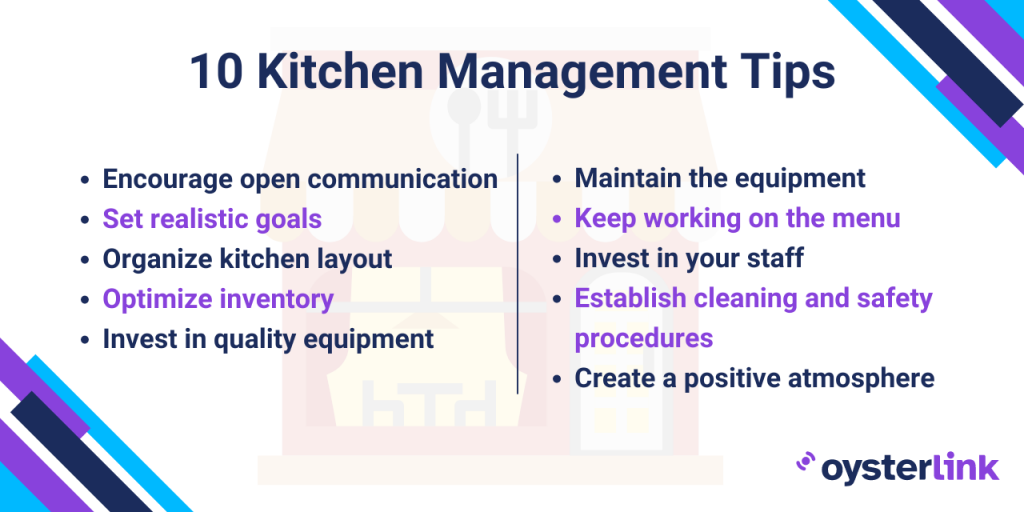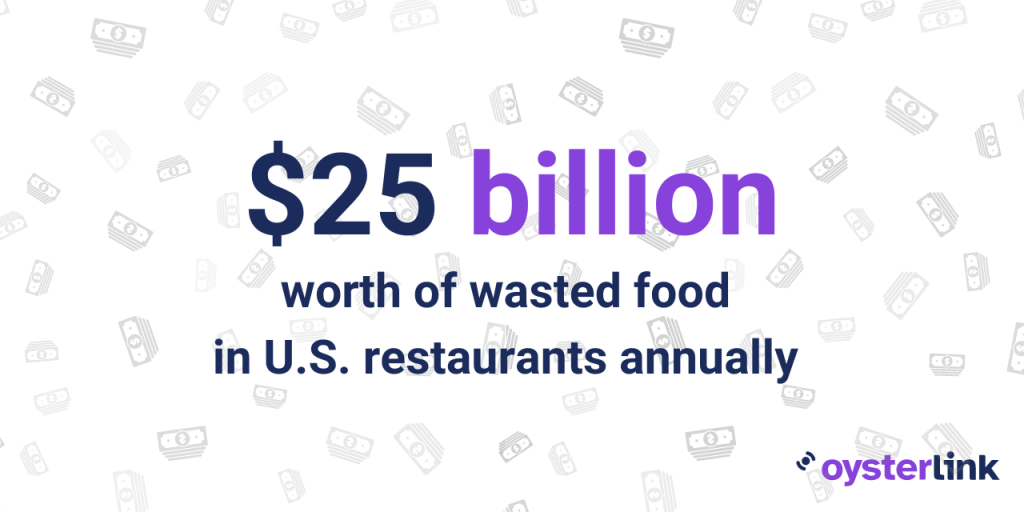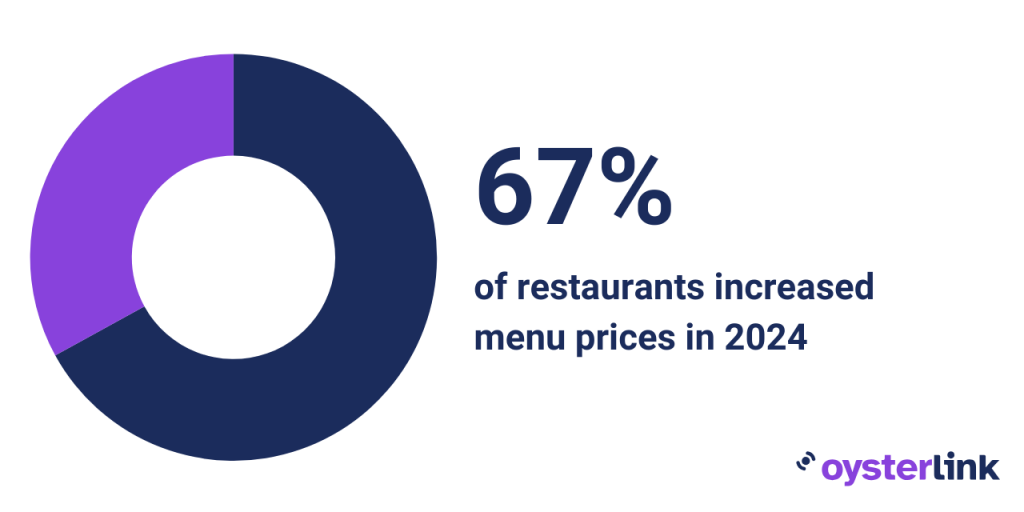Managing a restaurant kitchen is a challenging task. It requires careful consideration and planning to prevent inventory mismanagement, excessive financial costs and employee burnout.
The kitchen is the backbone of every dining establishment. Therefore, effective kitchen management can be one of the deciding factors that determine whether your restaurant makes it or breaks.
That is why we created this guide: to answer the question of how to manage a restaurant kitchen and show you some of the most common strategies for efficient kitchen management.
Who Is in Charge of Kitchen Management?
The organization and management of a kitchen typically falls on the shoulders of a Kitchen Manager.
While the leader of kitchen operations can also be someone with a culinary background (such as a Chef), this isn’t a necessity.
The individual who oversees kitchen operations is concerned about the food and quality but, even more so, with the operational needs and processes of a restaurant kitchen.
This can include everything from inventory management and budgeting to staffing and scheduling needs.
The Basic Duties of Kitchen Management
While not every Kitchen Manager will operate the same way and face the same challenges, there are common duties that must be performed in every kitchen.
Some of the main ones include:
- Supervising food quality
- Hiring staff and creating schedules
- Managing inventory
- Enforcing health standards
- Budgeting
Top 7 Kitchen Management Skills for Success
Efficient kitchen management requires a combination of deep industry knowledge, soft skills and technical expertise.
Some of the top Kitchen Manager skills necessary for effective kitchen management are:
- Leadership: It is the job of a Kitchen Manager to create a positive work environment and make the team feel motivated and appreciated.
- Communication: The Kitchen Manager must clearly articulate the responsibilities of each member of the team to reduce confusion and maintain consistency.
- Financial acumen: Understanding the budgeting needs of a kitchen is essential to control costs and reduce waste.
- Organization: From effective inventory management to accurate task prioritization, strong organizational skills are necessary for successful operations and running of a kitchen.
- Creativity: Being creative when it comes to updating menus is necessary to keep up with the trends and continuously attract restaurant guests.
- Problem-solving: Being able to remain calm under pressure, resolve conflicts and manage a crisis are skills necessary to maintain an uninterrupted kitchen workflow.
- Training and development: Regularly investing in your kitchen team, conducting training and developing career opportunities is essential to retain workers and keep them motivated.
How To Manage a Restaurant Kitchen: Top 10 Tips
Effective kitchen management is crucial for ensuring a smooth, efficient and profitable restaurant operation.

Explore some of the top tips for effective kitchen management below:
1. Encourage Open Communication
Open communication is essential for any team’s success.
In the kitchen, the success of operations depends on multiple team members, such as the Line Cook, the Prep Cook or the Pastry Chef.
It is the job of the leader — or, in this case, the Kitchen Manager — to foster a positive work environment where team members feel comfortable sharing ideas and improvement suggestions whenever possible.
Additionally, as the leader, you want to make yourself available to your team whenever needed. Make it possible for them to reach you and hold meetings where team members can speak up and give suggestions.
2. Set Realistic Goals
In connection with the previous point, you should set achievable goals and clearly communicate them to your team members.
If you can motivate your employees and train them to achieve the goals that are expected them of them, it can lead to reduced waste, optimized prep time or better service speed.
Once your team knows what is expected of them and how they can achieve it, they will be that much more motivated to achieve the kitchen goals.
3. Organize Kitchen Layout
Design the kitchen layout in a way that ensures that everything is within reach for each respective cooking station.
A well-organized kitchen reduces the time it takes to prepare and serve food, leading to greater efficiency and productivity.
4. Optimize Inventory
Restaurants in the U.S. waste about 11 tons of food annually, which translates into $25 billion worth of wasted products.

[Source: Restaurant365]
Optimizing inventory processes means not ordering too little or too much of a particular item necessary for the menu. Ordering the right amount of a particular item means reducing the waste and cutting unnecessary costs for the restaurant.
To avoid such high and unnecessary costs in your restaurant, consider implementing the “first in, first out” principle. This means that the food and ingredients that came to the restaurant first are also the first that should be used.
Additionally, you should determine the minimum threshold of a particular item that you need before reordering. Determine the amount of said enough that is considered too low so, when the item’s stock drops, you can immediately reorder.
5. Invest in High-Quality Equipment
Invest in durable and efficient kitchen equipment that can withstand the demands of a busy restaurant.
High-quality equipment will not only improve your kitchen’s processes but will also result in reduced costs for the restaurant considering that you will avoid costly repairs or rebuys of broken equipment.
6. Ensure Equipment Is Properly Maintained
Simply buying expensive, top-of-the-line equipment isn’t enough.
You need to establish cleaning procedures and hold regular checks to ensure that the equipment is used, stored and cleaned properly.
In doing so, you will increase the lifespan of your machines and avoid delays or interruptions in kitchen operations.
7. Keep Working on the Menu
Continuously review and refine the menu to keep it fresh and appealing.
Research shows that 67% of restaurants increased their prices in 2024. The data suggests that restaurants should constantly find innovative ways to improve their menus and attract new patrons.

[Source: SoundTrackYourBrand]
While this practice might incur additional costs, it is also worth noting that, for new and high-quality menu items, restaurant-goers are typically willing to pay an extra buck.
8. Invest in Your Staff
Regularly train your staff to enhance their skills and keep them updated on new techniques, safety standards and menu changes.
This will help your team grow on an individual level, foster higher levels of job satisfaction and improve your employee retention.
9. Establish Cleaning and Safety Procedures
Keeping the kitchen and various workstations clean is essential to maintain high standards of excellence.
A Kitchen Manager is responsible for establishing and enforcing cleaning procedures that will ensure a sanitary kitchen environment.
Establish the cleaning schedule and regular checks to ensure that the cleanliness of the kitchen never declines.
Additionally, you want to introduce different mechanisms to increase safety in the kitchen. For example, you might want to introduce anti-slip flooring to help kitchen employees move around the kitchen more easily.
10. Create a positive work atmosphere
Encourage a positive and collaborative work culture in the kitchen.
Recognize and reward hard work, provide suggestions for improvement, celebrate successes and provide support to team members when needed.
This will result in a happier workplace and boosted morale, leading to higher job satisfaction rates and retention.
Software Solutions To Help Manage a Restaurant Kitchen
Considering that it takes a village to make the kitchen operations successful, it is important to use every tool you have at your disposal.
You should consider the below tools that will help you better manage a restaurant kitchen:
- Inventory management systems: These will help you keep track of your inventory by monitoring stock levels, managing orders, reducing waste and more. One of the tools to consider in 2024 is the MarketMan.
- Point-of-sale (POS) systems: A POS system is a tool used particularly in retail and hospitality to facilitate sales transactions. It helps establishments manage inventory, customer data, sales and more. A popular POS system for restaurants is Square.
- Staff scheduling software: Staff scheduling software helps businesses by simplifying work schedules. It keeps track of employee hours, staffing per shift, time off requests and more. One tool that stands out in this category is 7shifts.
How To Manage a Restaurant Kitchen: FAQ
Being a good Kitchen Manager or supervisor is a matter of soft skills, technical expertise and experience.
As you work in a leadership position in a kitchen, you will naturally gain additional skills and talents that help you navigate the kitchen better.
Some of the common skills you need include:
- Communication
- Attention to detail
- Organization
- Ability to remain calm under pressure
- Inventory management
- Budgeting
To best organize your kitchen environment, you should optimize the layout.
Organize the prep and cooking stations in a way that requires minimal movement and ensures everything you may need is easily within reach.
Also, make sure that all the kitchen essentials are within reach for the staff members who need those.
Usually, no. The highest position in the kitchen is the Executive Chef or, alternatively, the Head Chef.




